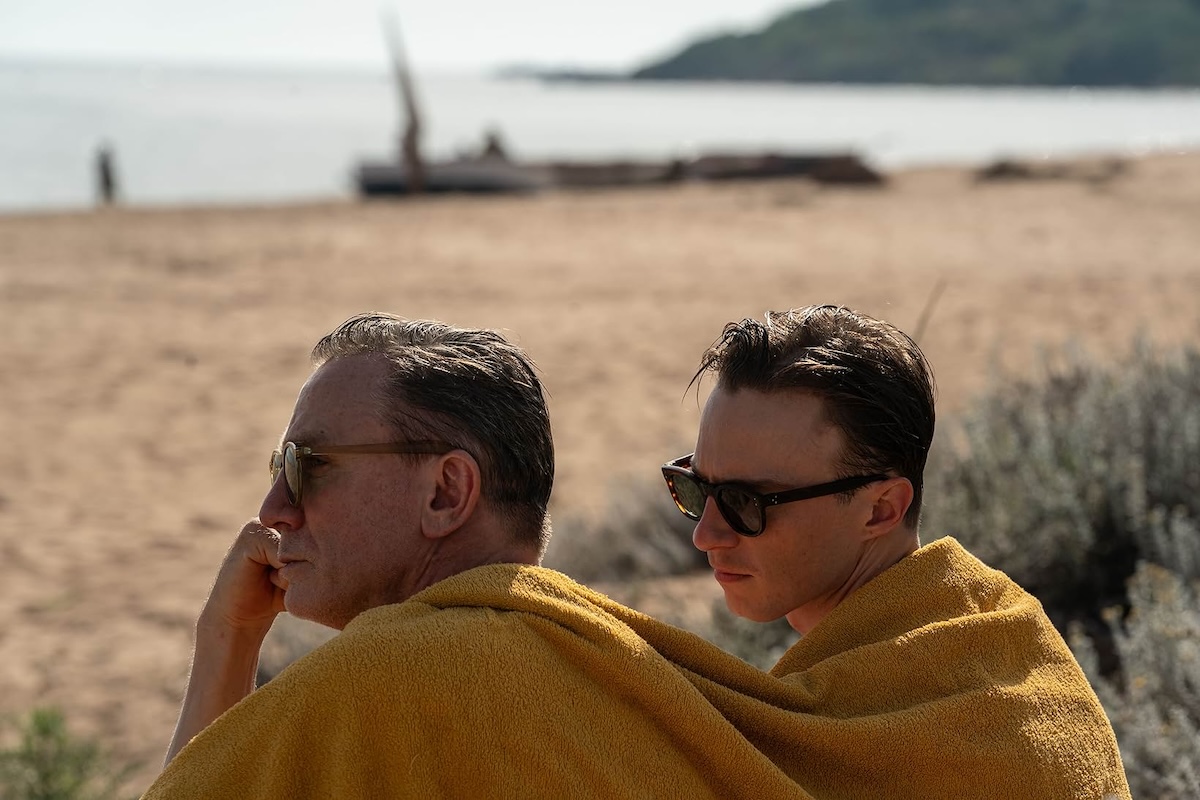Film Review | ‘Queer’
Daniel Craig Meets William S. Burroughs in Luca Guadagnino’s Latest Cinematic Challenge

Daniel Craig Meets William S. Burroughs in Luca Guadagnino’s Latest Cinematic Challenge

Understatement is not one of Luca Guadagnino’s strengths. Whether it’s Timothée Chalamet slipping Armie Hammer’s used boxer shorts over his head in Call Me By Your Name or Josh O’Connor and Mike Faist grunting and sweating on a sun-baked tennis court in Challengers, his films rarely hew to subtlety or suggestion, especially where matters of sex, desire, and libido are concerned.
In his second major release of the year, Queer, adapted from William S. Burroughs’s 1985 novella of the same name, Guadagnino manages to make shrewd use of this signature approach. Once again wrestling with the perils of desire in the hinterlands of identity, he builds a world that welcomes an overplayed hand.
Set primarily in 1950s Mexico City, Queer stars a harried Daniel Craig as William Lee (a stand-in for Burroughs) and Drew Starkey as Eugene Allerton, the cryptic object of Lee’s desires. Lee spends his days swinging between bar rooms and hotel rooms chasing various highs: the burn of mezcal and cheap brandy, the quick thrill of transactional sex, the hazy swaddle of heroin. Craig tears into Lee’s nervy, fidgety hunger with abandon, his stony features and jangled physicality underscoring the brittleness at Lee’s core.
His bombastic performance meets its match in the production design of Stefano Baisi and the evocative cinematography of Sayombhu Mukdeeprom. In their hands, Lee’s Mexico City becomes a diorama of itself. Theatrical and self-consciously artificial, it is a plywood and plaster cloth fantasia, the kind of place that could only ever exist on the soundstages of Rome’s famed Cinecittà production facility, where Guadagnino wisely opted to shoot.
It’s a fitting environment both for Guadagnino’s more garish directorial impulses and for the colorful cadre of loosely closeted expats with whom Lee drinks and gossips in the midday heat. Where most treatments of queer life and sexuality in this period dwell in darkened corners and smoky clubs where suggestive glances can be quickly exchanged and plausibly denied, Lee and his ilk are refreshingly shameless.

Uninhibited and bawdy, they gather in taverns and cafés that Guadagnino often floods with natural light. Windows are rarely obscured behind curtains or shades, and doors are often flung open to the street. In the fantasized version of Mexico City Lee inhabits — draped in shades of Fassbinder, Powell and Pressburger, Minelli, Preminger, and more — little is hidden or opaque. It becomes a breezy playground of carnal and chemical pleasures through which he stumbles with relative ease.
It does not take long, however, before this scale-model fantasy shifts on its axis. One night, while traipsing from one abortive pickup to the next, Lee encounters Eugene, a fellow U.S. expat recently discharged from the Navy. Dazzlingly pretty, impossibly hunky, and, as we are told multiple times, “not queer,” Eugene is in almost every way Lee’s opposite: his skin dewy, his clothes fitted and preppy, his manner cool and maddeningly cryptic.
If the visual mismatch were not enough to signal the stormy attraction that will soon flourish between the two, Guadagnino tips his hand by having the odd pair lock eyes across a literal cock fight — an undeniably silly, Challengers-esque bit of staging that probably wouldn’t work anywhere but Cinecittà.
Eugene crashes into Lee’s world like a block of marble, his surfaces too slick and cold to grab hold of, but his beauty too potent and precious to ignore. Starkey fits the bill exactly. Offering an appropriately restrained and evasive performance, he transforms Eugene into a cypher, a screen onto which Lee projects all manner of fantasies. Again, on this count, Guadagnino shows little patience for subtlety, making liberal use of transparencies and superimpositions to depict Lee’s frustrated yearning.
Again, though, the gimmick mostly works. As Lee’s body flickers in and out of substantiality, the film evolves into a pas-de-deux between transparency and opacity. Even as the two tangle in nearly every pair of sheets they can find, Lee’s efforts to draw the curtains on Eugene — to somehow transcend the frustrations of circumstance, the limits of the body, and the mystifications of language — grate constantly against Eugene’s increasingly severe efforts to clasp them shut once again.
This strained spiral eventually leads the pair to the jungles of South America, where an ayahuasca trip presided over a more-or-less feral botanist (Lesley Manville, delightfully unhinged as Dr. Cotter) brings the calamity of desire into sharp and surprisingly moving focus. For all the mysteries his direction tends to dispel, Guadagnino, in the final moments of Queer, resolves to give ambiguity its due. Along with Lee and Eugene, we are taken on a bewildering, Kubrickian journey through space and time. At the end of it all, we’re faced with the possibility that desire may well be a window we can’t see through, a language we can’t speak, or a skin we can’t get inside of. How queer.
View trailer here.
Please note this login is to submit events or press releases. Use this page here to login for your Independent subscription
Not a member? Sign up here.
You must be logged in to post a comment.